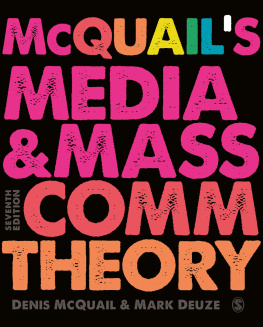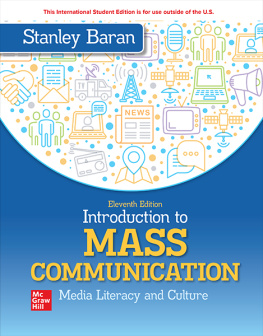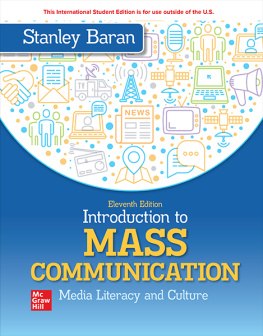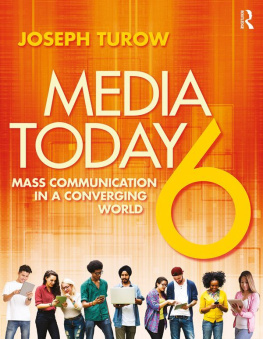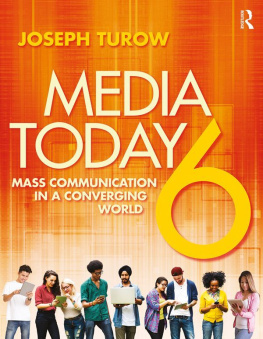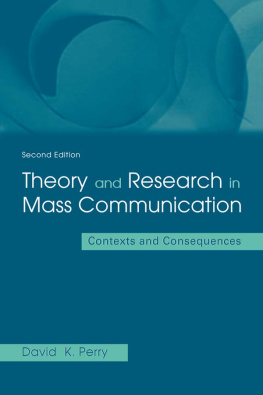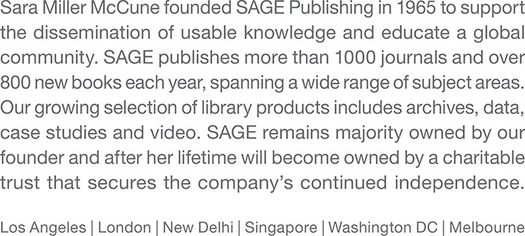SAGE Publications Ltd
1 Olivers Yard
55 City Road
London EC1Y 1SP
SAGE Publications Inc.
2455 Teller Road
Thousand Oaks, California 91320
SAGE Publications India Pvt Ltd
B 1/I 1 Mohan Cooperative Industrial Area
Mathura Road
New Delhi 110 044
SAGE Publications Asia-Pacific Pte Ltd
3 Church Street
#10-04 Samsung Hub
Singapore 049483
Mark Deuze and Denis McQuail 2020
First edition published 1983
Second edition published 1987
Third edition published 1994
Fourth edition published 2000. Reprinted 2001, 2002, 2003 and 2005
Fifth edition published in 2005. Reprinted 2006, 2007, 2008 and 2009
Sixth edition published in 2010. Reprinted 2011, 2012, 2014, 2015, 2016, 2017, 2018 three times and 2019
This seventh edition published 2020
Apart from any fair dealing for the purposes of research or private study, or criticism or review, as permitted under the Copyright, Designs and Patents Act, 1988, this publication may be reproduced, stored or transmitted in any form, or by any means, only with the prior permission in writing of the publishers, or in the case of reprographic reproduction, in accordance with the terms of licences issued by the Copyright Licensing Agency. Enquiries concerning reproduction outside those terms should be sent to the publishers.
Library of Congress Control Number: 2019955634
British Library Cataloguing in Publication data
A catalogue record for this book is available from the British Library
ISBN 978-1-4739-0250-3
ISBN 978-1-4739-0251-0 (pbk)
Editor: Michael Ainsley
Editorial assistant: Amber Turner-Flanders
Production editor: Imogen Roome
Copyeditor: Sarah Bury
Proofreader: Leigh C. Smithson
Indexer: Adam Pozner
Marketing manager: Susheel Gokarakonda
Cover design: Lisa Harper-Wells
Typeset by: C&M Digitals (P) Ltd, Chennai, India
Printed in the UK
At SAGE we take sustainability seriously. Most of our products are printed in the UK using responsibly sourced papers and boards. When we print overseas we ensure sustainable papers are used as measured by the PREPS grading system. We undertake an annual audit to monitor our sustainability.
Preface
Early in 2009, Denis and I had coffee outside a little caf in Padua, Italy. We were attending a symposium organized by the European Journal of Communication on the consequences of media change. A significant discussion among the participants emerged around the notion of the value of media and mass communication theory and research (see McQuail, 2009). What is our contribution? What story can we, as a field, tell the world? How do we prevent our message being co-opted and colonized by other, older disciplines, such as sociology, psychology, and others? As we chatted, I asked about the new edition of his seminal handbook of the field, and wondered how this book could help structure and give direction to such existential questions. He smiled, and said that the sixth edition would be coming out soon and that this would be his last one. I immediately felt the weight of this statement in terms of the formidable role his book has played in shaping and defining the field of mass communication, of the immense impact his work has on articulating what our knowledge contribution is (or could be), and, in a personal sense, the fundamental role this book has played in my career and understanding of what it is that I am doing.
In subsequent years, an idea started brewing. It was perhaps much more of an emotion than an idea: I felt something needed to be done with the book, with Deniss legacy, with all the students at all the schools and universities around the world who worked their way through McQuails Mass Communication Theory from 1983 until 2010 and beyond. With the enthusiastic support of Mila Steele at Sage I started developing a proposal for a new, seventh edition of the book. The original plan was pitched in 2013 it was ridiculously ambitious, based on the expectation that I could somehow find a way to take one or two years off teaching to focus completely on the monumental work that this book would be. Although Denis did his best to support and encourage me over the years that followed, life happened. I moved back to The Netherlands after ten tremendous years working and living in the United States, started a demanding new job at the University of Amsterdam, and reformed the band Skinflower that I used to play with back in the 1990s.
Then 2017 came, and the devastating news arrived about Deniss passing, on June 25. I remember meeting Denis at the University of Amsterdam in 1997, when the Amsterdam School of Communications Research (ASCoR) was founded, and I was one of the first PhD students. A fond memory is a session ASCoR organized, where Denis would sit down with the first group of PhD students to give feedback on their proposals. When we met, he laughed heartily and said: I just hope you will manage to find the time and money somewhere to do all the things you are planning to do!
In the following years I had the privilege to work with Piet Bakker to teach McQuails Mass Communication Theory to first-year students in Amsterdam, an experience that subsequently informed my approach and love for teaching such large undergraduate review courses at Mnster University, Indiana University, and back at the University of Amsterdam (and this time at the Department of Media Studies).
In short, I always had many reasons to engage with and embrace his book of books, personal as well as professional. After his passing, there were no more excuses: the work had to start. Thanks to the continued support and guidance from Mila and Michael Ainsley at Sage, the invaluable help from my friend and colleague Pauline van Romondt Vis in working through the manuscript and making a first assessment of what needed to be done, and the critical reading eye of a small team of dear friends and experts Peter Neijens, Terry Flew, Kaarle Nordenstreng, Peter Golding, Claes De Vreese, Cristina Archetti, and Sonia Livingstone who were willing to take a look at chapter drafts, I kept working on the seventh edition throughout 2017, 2018 and 2019, taking breaks to either teach, finish other projects, play music, and grill.
The new edition of McQuails Media and Mass Communication Theory is, first and foremost, a homage to the work and influence of Denis. This is expressed both in keeping true to his structuring of the book (and the field), and by following his narrative through into the world of pervasive, ubiquitous, mobile, social and always-online media we live in today. At the same time, I have taken the liberty to take the first steps in slightly changing things. You will notice that we added Media to the title of the book in order to do justice to the intellectual strides that have been made in media theory, and to signal our intent to bring scholarly traditions of theory and research on media and society from the humanities and social sciences into conversation. In this book you will not find neat separations between these areas of investigation, inspired by both my own background and, more importantly, by consistent calls across the field for more integrated theoretical frameworks, mixed methods and triangulation, in order to do justice to the complexities and nuance of our mass media environment and the mass communication process.

